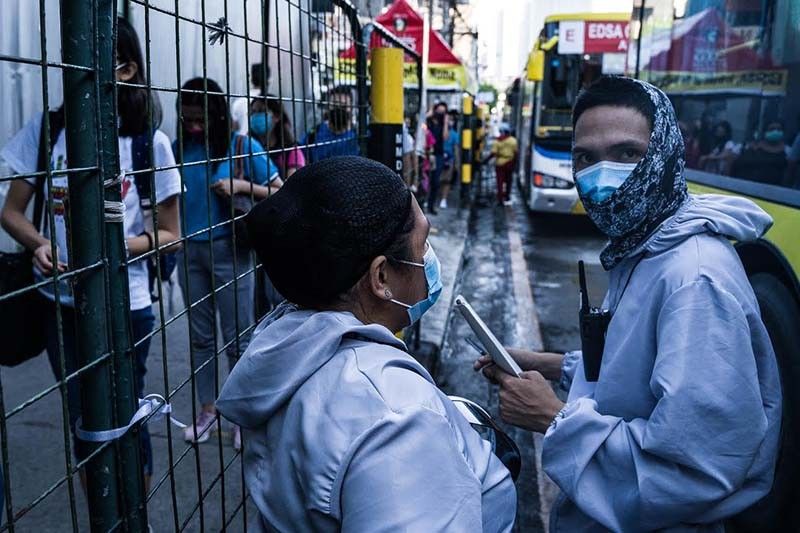Philippines exits recession in Q2, but recovery shallow

MANILA, Philippines (Update 2, 3:06 p.m.) — The Philippines is finally out of recession in the second quarter, posting its best annual growth rate in 32 years, but the rebound was shallow and new lockdowns triggered by the fast-spreading Delta variant are threatening to reverse gains.
Gross domestic product — or the sum of all goods and services created in an economy — grew 11.8% year-on-year during the April-June period, the Philippine Statistics Authority reported Tuesday. The latest reading was a turnaround from revised 3.9% contraction in the first quarter, and the highest since 12% growth in the fourth quarter of 1988.
Technically, the second quarter reading marked the end of recession for pandemic-stricken Philippines following five consecutive quarters of contraction, but whether that translates to actual improvements in Filipinos' incomes and jobs being restored is another question.
What economists call “base effects” were mostly responsible for the headline-grabbing figure. This means that because the pandemic sank the economy to historic-lows last year, small gains from easing lockdowns would translate to stronger GDP reading this year. The economy collapsed at a record-breaking rate of 17% in the second quarter of 2020.
But Socioeconomic Planning Secretary Karl Kendrick Chua disagreed. “The robust performance is driven by more than just base effects. It is the result of a better balance between addressing COVID-19 and the need to restore jobs and incomes of the people,” Chua told a press conference.
If anything, the rebound was purely mathematical rather than a reflection of a convincing recovery. In fact, the economy is not yet back to its pre-pandemic shape despite the superlative growth rate last quarter. National Statistician Claire Dennis Mapa reported that, at constant 2018 prices, GDP in the first half was estimated at P8.9 trillion, up 3.7% year-on-year but 6% lower than P9.4 trillion recorded in the comparable period in 2019.
Worse, GDP contracted 1.3% quarter-on-quarter in April-June period, a reversal from 0.3% sequential growth chalked up in the first quarter. This was not surprising at all after Metro Manila and four nearby areas were placed under enhanced community quarantine (ECQ) — the strictest lockdown there is — from late March to mid-April to arrest a deadly surge of infections at the time.
But the Philippines is going full circle as Metro Manila and some provinces outside the capital briefly returned to ECQ in August, this time to curb a flare-up of cases believed to be fueled by the highly-contagious Delta variant. That said, Nicholas Mapa, senior economist at ING Bank in Manila, was convinced that new lockdowns could derail the fragile recovery.
“With quarterly GDP turning negative we can expect the economy to revert to the recession by the third quarter as momentum slows further due to the ongoing enhanced community quarantine due to Delta variant,” Mapa said.
2021 target at risk
Alex Holmes of London-based Capital Economics agreed with ING Bank's Mapa. “The Philippines' chances of a strong economic rebound from the contraction recorded in Q2 are looking slim,” Holmes said. "The government’s 6-7% GDP growth forecast for the year now looks out of reach."
Breaking down the GDP data, all sectors except agriculture — which was once thought as the country’s pandemic saving grace — grew in the second quarter, with the industry sector leading the pack after growing 20.8% on-year.
On the expenditure side, typical growth driver household spending grew 7.2% on-year, but declined 2.4% quarter-on-quarter. Government spending, roundly criticized to be insufficient over the course of this health crisis, collapsed 4.9% annually due to “high base” from last year when the government handed out cash aid to locked-down Filipinos. “We’re normalizing from that big increase. That doesn’t mean were not spending,” Chua said.
Indeed, the Duterte administration’s 6-7% growth goal for this year now seems difficult to achieve. PSA’s Mapa said GDP should grow by 8.2% in the second half of the year if the economy were to hit the low-end of the target range. To hit the high 7% mark, the economy should muster a growth of 10.2% in the remaining months of the year.
“The longer we have the ECQ, the harder it would be to hit our targets,” Chua said.
RELATED VIDEO:
Palace hopeful economy will recover in Q4 amid lockdowns
Malacañang is hopeful that the economy will recover in the fourth quarter despite the imposition of lockdowns.
"We are happy that we have such a high economic growth and we're hoping that while we are implementing a lockdown for two weeks, we can recover in the last quarter," presidential spokesman Harry Roque said at a press briefing yesterday.
"We imposed this lockdown now so we can recover in the last quarter of the year because the last quarter is traditionally the most robust time in terms of the economy," he added.
Roque said the second quarter growth is a proof that measures are being done to save lives while promoting livelihood. — with report from Alexis Romero
- Latest
- Trending






























